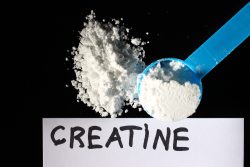 Aging poses a constant challenge for our body’s muscles, as they gradually lose mass over time. This decline becomes particularly debilitating after the age of 60, leading to physical limitations. However, a century-old compound known as creatine has the potential to support strength training, enhance muscle growth, and even improve cognitive function. Surprisingly, this valuable information remains relatively unknown to the general public.
Aging poses a constant challenge for our body’s muscles, as they gradually lose mass over time. This decline becomes particularly debilitating after the age of 60, leading to physical limitations. However, a century-old compound known as creatine has the potential to support strength training, enhance muscle growth, and even improve cognitive function. Surprisingly, this valuable information remains relatively unknown to the general public.
Creatine, first discovered in 1832, is an amino acid that is naturally produced in the brain and liver. The human body produces approximately 1 gram of creatine daily. Furthermore, creatine can also be obtained through the consumption of animal foods, such as salmon and red meat. This amino acid is crucial in maintaining the production of ATP, a vital energy-carrying molecule found in the cells of all living organisms. Whether it’s the simple act of lifting a pencil or the incredible feat of lifting 500 pounds, ATP plays a vital role in facilitating all muscle movement.
In the 1960s, researchers made a significant discovery about the vital role of creatine in the body. They found that when creatine synthesis is blocked, the energy molecule ATP is quickly depleted, resulting in a loss of muscle contraction ability. This groundbreaking observation led to an abundance of studies, which have overwhelmingly confirmed that creatine is essential for muscle growth. In fact, more than 500 studies have shown that supplementing with creatine can increase lean body mass, enhance strength, improve bone health, and even boost cognitive function.
Research suggests that combining creatine with training can enhance muscle growth. However, recent studies indicate that creatine supplementation may also have cognitive benefits. In fact, it has been found to accelerate the recovery process for individuals suffering from concussions and traumatic brain injuries. Notably, a study even observed improvements in communication, post-traumatic amnesia, and overall cognitive function.
As we age, our natural creatine levels decline, affecting cognitive function. However, by replenishing these levels, creatine has shown to potentially improve cognition. It is important to note that creatine does not actually enhance cognitive capacity, but rather its absence can lead to cognitive impairment. This is particularly important for individuals on vegan or vegetarian diets, as creatine is primarily found in animal foods. In fact, a study demonstrated that creatine supplementation improved memory in vegetarians. Importantly, even at high dosages, there are no reported unwanted side effects. Given its proven safety and established health benefits, there is compelling evidence to suggest that everyone should consider supplementing with creatine.
To view the original scientific studies click below:
Creatine supplementation improves muscular performance in older men
Long-term creatine supplementation improves muscular performance during resistance training in older women





